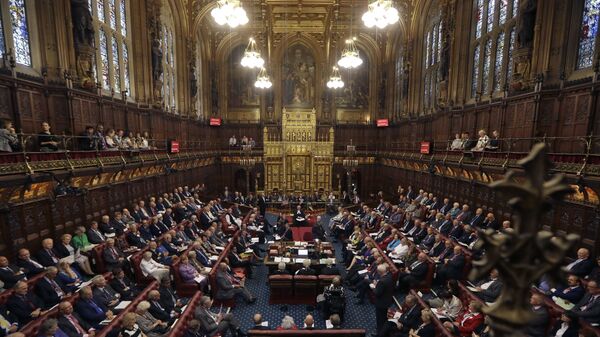British Prime Minister Theresa May's plans for the United Kingdom's exit from the European Union are set to receive another blow as the country's House of Lords is widely expected to vote for Britain to remain a member of the EU's Customs Union.
Brexit: House of Lords set to defeat UK govt on key piece of EU withdrawal legislation, urging an arrangement which “enables the United Kingdom to continue participating in a customs union with the European Union”https://t.co/O5NxEn6zaP
— Alfons López Tena #FBPE (@alfonslopeztena) April 15, 2018
The House of Lords is expected to back an amendment this week calling for the government to remain in a customs union with the EU, the Financial Times reports.
— Bertrand (@Bertran08023492) April 16, 2018
"This is utter stupidity as it would mean we cant sign trade deals in our own right. We voted to LEAVE Customs Union."
#UK House of Lords vote on #Brexit this week looks likely to support Customs Union with #EU. If so, will force another go in House of Commons in a few weeks. Given most MPs are not pro-Brexit, could be the start of an interesting couple of months.
— Robin Bew (@RobinBew) April 16, 2018
The expected result will put Britain's upper house, including many senior figures in the Conservative Party, on the same page as the position of the Labour Party under Jeremy Corbyn. The Opposition leader has had to balance the competing constituencies of the party, the majority who voted Remain and historic Labour voters in the UK's more deprived regions who voted Leave.
As it stands, Labour's policy is to withdraw Britain from the European Union and the Single Market which places restrictions on certain economic policies such as government subsidy for domestic industry. Under Labour's policy however, Britain would remain a member of the Customs Union, through which the EU's 28 member states negotiate trade agreements collectively rather than as individual countries.
In her 2017 Lancaster House speech, Mrs. May set out the Conservative Party's intention to leave the EU as well as all of its constituent institutions including the Single Market, Customs Union and the European Court of Justice. The upper house of Britain's legislative bodies, which is unelected, has been united for the most part in opposition to Brexit.
Prime Minister May has also faced opposition to her Brexit roadmap in the House of Commons, where on December 14 Dominic Grieve led a pro-EU faction of the Conservative Party in voting against the government's EU Withdrawal Bill. Another prominent Conservative and former minister, Anna Soubry in February threatened the Prime Minister that she and other like-minded Conservatives would abandon the party if the influence of Hard Brexiteers such as Agriculture Secretary Michael Gove, Foreign Secretary Boris Johnson and Jacob Rees-Mogg is not curbed.


